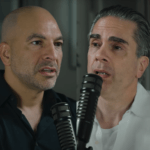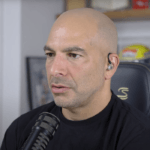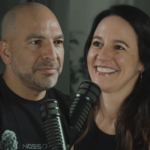Bill Perkins is one of the world’s most successful hedge fund managers and entrepreneurs, and the author of the bestseller, Die With Zero. In this episode, Bill unpacks the Die With Zero philosophy which challenges conventional thinking related to the balance between health, wealth, and time—the three variables important for fulfillment. Bill makes the case that we should strive for maximum net fulfillment rather than net worth (or even health). He argues that we need to optimize our life to have memorable experiences before it’s too late and that most people are over-saving and under-living. Bill also explains how one can apply the principles in Die With Zero to break out of “autopilot” and optimize their life to achieve maximum net fulfillment.
Subscribe on: APPLE PODCASTS | RSS | GOOGLE | OVERCAST | STITCHER
We discuss:
- Bill’s upbringing, background, and first job on Wall Street [3:15];
- A missed experience and feeling of regret that shaped Bill’s thinking [14:15];
- Thinking in terms of time, and the relationship between money, time, and health [17:00];
- Solving for net fulfillment and allocating your time based on the seasons of life [27:15];
- How Bill thinks about risk, opportunity costs, and the difference between fear and risk tolerance [35:30];
- Optimizing for fulfillment, finding purpose outside of work, and more [41:45];
- Thinking about the order of experiences you want to have based on seasons of life [50:00];
- Bill’s unique perspective on philanthropy and a more impactful way to give money away [54:45];
- Applying the principles in ‘Die With Zero’ to maximize fulfillment [1:04:00];
- How to break out of living life on autopilot [1:14:30];
- When should your net worth peak? [1:18:00];
- Taking calculated risks [1:21:30];
- Bill shares a lesson from his incredible birthday [1:25:15];
- How Bill’s philosophy has evolved since writing Die With Zero [1:34:00]; and
- More.
Bill’s upbringing, background, and first job on Wall Street [3:15]
Impact of Bill’s book on Peter
- When Peter posted on Instagram about 3 books he’s read in the last 12 months, he didn’t expect it to have such an impact on how he thinks about things
- Even though they are completely different books, they have a unifying theme about improving the quality of life
- Peter doesn’t remember who recommended Die with Zero, he just remembers thinking it sounded interested
- He ordered it and then just couldn’t put it down
- He made his wife read it
- He bought many copies of it (as well as the other 2 books mentioned earlier) and started handing them out like a triplet copy
Bill’s background
- Bill grew up in Jersey City, New Jersey
- His degree is in engineering, but he doesn’t want people to be impressed that he’s an engineer
- He barely graduated; he was a super slacker
- He played football at the University of Iowa
- A defensive back, but was mostly on the bench
- He was a walk-on
- He was trying to get a scholarship, he had a partial scholarship
- He broke his leg at the growth plate, and that ended his football career
Bill’s first job
- He was lost after graduation and was really an underachiever at the time
- His godfather gave him the talk, “What are you going to do with your life?”
- At this point he knew he didn’t want to go into engineering
- It was a cookie cutter life without any kind of entrepreneurial spirit in it
- You work on a subsection of a chip, here’s your career path, etc.
- It was unattractive and “seemed like death”
- At this point he knew he didn’t want to go into engineering
- At the time Bill saw the movie Wall Street and realized he wanted to go work in stocks, he wanted to be rich
- His godfather recommended a firm in commodities that was looking for screen clerks
- This was 1991
- Bill got an introduction and was shown around the trading floor
- People are yelling and screaming and they’re kind of in casual wear and it’s like Trading Places and all this energy
- He thought, “Wow, if that guy can be rich, so can I”
- They didn’t hire him then but he hung out downstairs every day calling, “Can I come up? Can I become a peon here?”
- Finally after 3 days they let him become a peon
- This job was checking trades and sneaking sandwiches on the floor for traders
- It’s literally the worst version of the mail room
- The system in the old days was where guys would yell and scream across a pit and write their trades on a pick card and also in their trade book, and they’d throw the pick cards into a center
- There’s a guy with glasses and a giant net and all these cards would go to him
- He would catch them, put them down the chute, and they would be entered into a computer system
- Bill’s job was to check the traders log versus the computers log
- And your name becomes your trader
- So if your trader was, “Why Not” or “S&M”, that was your name
- Clerks are running around the floor going, “Why Not, S&M, Why Not.”
- If you’re Why Not you’re like, “Why Not here. Over here. I’m selling 5 lots of 54.80, not 3 lots of 54.80”
- If you know the same trade, then it’s a simple process to correct it in the system
- And if you don’t, you’re like, “No, no, I definitely know only 3 lots,” then you go to the traders immediately and they reconcile it
- That was the system, running around all day checking trades
- This was in Four World Trade Center (back when the World Trade Center was there)
How much were you learning business at this job?
- Peter can imagine one could take a job like that and not actually learn what’s happening, what the machine is doing
- This is when he decided to “turn it on” and learn every single thing there is about this business
- He was reading books at night about trading, about the oil business, about options, about whatever
- He was a sponge and as diligent as he could possibly be as a 20-year-old
- He was really trying to make himself invaluable no matter where he was
Were you living in Manhattan at the time?
- No
- He first lived at home with his mom, which completely cramped his style
- He started driving a limo at night to makes ends meet
What were you getting paid in that first job?
- Sub $16,000 a year
- But he was getting raises very quickly because he made himself valuable
- He would work at night and would make more money driving the limo on a daily basis
- Traders would be drunk and tip you
- He wasn’t there for the current income but the future income
- He got an apartment with another clerk named Jason Ruffo who had a studio on the Upper West Side
- Jason put up a wall by the kitchen and kind of made this small room in this studio
- It was living in like a pizza oven type space
- But it was great because he was in New York City out of his mom’s house
- Gradually he got into that life of what he calls a “buppie” (black urban professional)
- You know, buppies and yuppies?
- And that was the beginning of his journey
Was your dad in the picture at this time?
- His parents were divorced
- His dad was older and in poor healthy in Jersey City
- During this time he’d had multiple strokes
- Bill is fairly stubborn but his dad was stubborn to the extreme
- The doctor says don’t do this… all the things you would tell him not to do and you need to be doing…
- His dad was like, “Ah, the hell with that.”
Had your parents gone to college?
- His dad did
- He got a scholarship to the University of Iowa
- He was a real badass with no intentions of going to school
- He walked by a football field when he was a kid in high school and was like, “I want to do that.”
- The coach was like, “You don’t know anything about football”
- His dad says, “It seems like it’s about hitting people and I know how to hit people”
- So they gave him some raggedy uniform, he comes out for a practice, and in the next practice he has a brand new uniform
- He’s all everything, gets recruited to go to University of Iowa to go to college (in 1959)
- His mom finished college while Bill was a preteen or late teens
- He had the benefit of 2 college educated parents
How much did your parents understand your drive, your aspirations in this new role?
- This was in contrast to his not achieving his potential in high school and college
- Now all of a sudden, he’s hustling, working 2 jobs, reading, learning
Were they privy to that sort of metamorphosis in you?
- They saw it later
- He was the kid that didn’t take out the garbage
- Bill always says, “Don’t tell your parents your dreams because they’ll just piss on them, because they’ve seen you at your worst and your failures as you’re growing. They have this kind of image of you when you were the caterpillar not the butterfly.”
- Bill remembers the time when he got a raise and did the calculation and was like, “Holy shit, I make more money than my mom. I’ve made it… I’m real, I’m legit. I’m a buppie.”
- It wasn’t until he got recruited to go to Houston and started buying the assets that adults start buying, and paid his mom back for something he did when he was a teenager that she didn’t know about, that his parents realized his transformation
- He was driving his mom’s car (a stick Toyota) and his friend Pete Thibold wanted to learn how to drive stick
- Long story short, he hits the gas instead of the clutch, spins the car out, the back of it spins around and hits a telephone pole; the trunk pops up and it has this big giant dent
- Bill tells his mom this story that they went to go get pizza and parked it and then a truck must have hit it on the side or bumped it and went on
- He felt guilty about this lie to his mom about he car and said, “One day I’m going to pay for this car in spades”
- And so one day he gave his mom $40,000 and explained, “Mom, remember that time the car had that brown mark on it and we told you it was a truck? Well, this is what really happened.”
- She just laughed and said, “I knew something was strange about that, the story fit but there was something strange about that.”
A missed experience and feeling of regret that shaped Bill’s thinking [14:15]
Jason’s trip
- In his book, Bill writes about the different point of view he and his roommate had on future earnings and how this impacts what you do with your time
- He tells the story about when Jason took the trip
{show notes preview}

Bill Perkins
“The Last Cowboy” according to the Wall Street Journal, Bill Perkins is one of the world’s most successful hedge fund managers and entrepreneurs. After studying electrical engineering at the University of Iowa, Bill trained on Wall Street and later moved to Houston, TX where he made a fortune as an energy trader. His professional life also includes work as a Hollywood film producer, producing Afterlife (2009), Unthinkable (2010), and The Baytown Outlaws (2012). Perkins is currently the CEO of BrisaMax Holdings, a consulting services firm based in the U.S. Virgin Islands.
Now at age 52, Bill views his career as an engine for personal growth and spends his time exploring the world, savoring his relationships, and taking in all that life has to offer.
Die With Zero is a labor of love project. Bill has been developing the principles outlined in the book since his first job making $16,000 a year in the 90’s as a screen clerk for the New York Mercantile Exchange. [diewithzero.com]
Instagram: @billperkins
Twitter: @bp22






Peter this article and your presentation of it is worth the annual subscription.
Thank you 1000 times.
Tom Wootten, 66.
Love the philosophy. I think Perkins misses a few points (you raised the first). 1. Work can be fulfillment for some of us. 2. The depletion stage of wealth can has an ;often unexpected) impact on most of us, rational or not.
Thanks for a great discussion. I am already in the club.
Also, happy to know that I am NOT the only person who never graduated from Tetris…..
While I think the concepts in Bill’s book are valid and worth considering there were a couple of things in this podcast that irritated me. First there was Peter referencing the “No one on their death bed ever wished they spent more time working” thing. Really? Only rich people believe that. I recently retired a little early and I can promise you that if I run out of money and spend a few years destitute at the end of my life I will regret not working a few more years.
Then there is Bill claiming that anyone worried about getting sick in old age “just needs to buy some long tern care insurance.” Another thing only a rich person would say. Ever priced that out for a 50 year old? And once you buy it you can be sure that premiums will go up. Likely when you are retired and living on a fixed income. All in all LTC insurance is a bad deal. Better to save/invest money on your own.
Here is a cnbc article on LTC: https://www.cnbc.com/2019/09/08/how-to-deal-with-double-digit-rate-hikes-on-long-term-care-insurance.html
Having said all that, there is merit in what Bill has to say. I just signed up for an ice hockey league. Fact is, I don’t have much more time to do that.